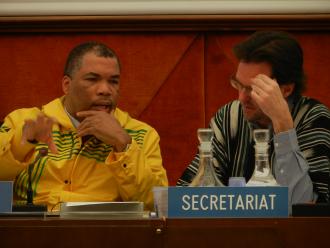What’s (still) wrong with ACTA, and why governments should reject the illegitimate agreement
This is a blog about the Anti-Counterfeiting Trade Agreement (ACTA). More information is available here: /acta
This is a blog about the Anti-Counterfeiting Trade Agreement (ACTA). More information is available here: /acta
Every year, USTR publishes the names of countries that do not adequately protect intellectual property rights. (See /ustr/special301) . Among the classifications are the Priority Watch List (PWL) and the somewhat lower status Watch List (WL).
President Obama claims to have kept “lobbyists” off the advisory boards for USTR. The Obama Administration relies upon the narrow legal definition of those persons who register to lobby the US Congress, which excludes expenditures to direct, supervise or support the lobbyists, and expenditures of many staff and consultants who are not fully engaged in lobbying the Congress. Expenditures to influence the executive branch (including USTR) has very little if any regulation, and are not counted as lobbying. Continue Reading
18 January 2012

|
| Chair of IGC 20, Ambassador Wayne McCook, Jamaica, and Wend Wendland, WIPO Courtesy of Marc Perlman |
On February 16, 2012, the USPTO held a public hearing on genetic diagnostic testing, permitting stakeholders to present their views relating to DNA patents, exclusive licensing, patient health and genetic testing, particularly as they relate to secondary or confirmatory genetic diagnostic testing. Notes from the hearing and speaker statements are included below. KEI’s oral statement can be found here.
On February 16, 2012, the USPTO held a public hearing on genetic diagnostic testing, pursuant to a Congressional mandate that was part of the America Invents Act. This mandate directed the USPTO to evaluate several questions related to genetic diagnostic testing, particularly with regard to second opinion or confirmatory genetic testing. USPTO will deliver its final report to Congress in June. Notes from the public hearing are available in a separate blog post.
This is an essay about strategic ignorance, as regards evidence relevant to policies that cost consumers and taxpayers billions of dollars.
The United States government grants 20 year patents on pharmaceutical drugs, and it also provides a growing number of other non-patent incentives and subsidies to stimulate R&D investments in new medicines. Are these incentives and subsidies necessary or cost effective? How would anyone know?
Here are some of the incentives we offer:
On Wednesday February 22, 2012, from 12:30pm to 2:30pm, KEI will host a roundtable discussion on international copyright negotiations. The location of the meeting will be 1621 Connecticut Ave, NW, Suite 500, Washington, DC 20009. There will be an opportunity to participate by telephone, via toll free calls in many countries. (To register or for details on call-in, email manon.ress@keionline.org. If you want to try to join by skype, we will do our best.)
The topics to be discussed are the following International copyright negotiations:
On February 14, 2012, KEI filed an affidavit in an India compulsory licensing case involving Bayer patents on cancer drug Sorafenib (Nexavar). The price for Nexavar in India is $47 per 200 milligram tablet. At a daily dose of 4 tablets, this comes to $5,637 per month, or more than $68 thousand per year. The per capita income in India was $1,330 in 2010.
Initial FDA approval
Date of FDA NDA application 21-923: Signed July 6, 2005. Received by FDA on July 8, 2005.
Date on FDA approval: December 20, 2005.
Continue Reading